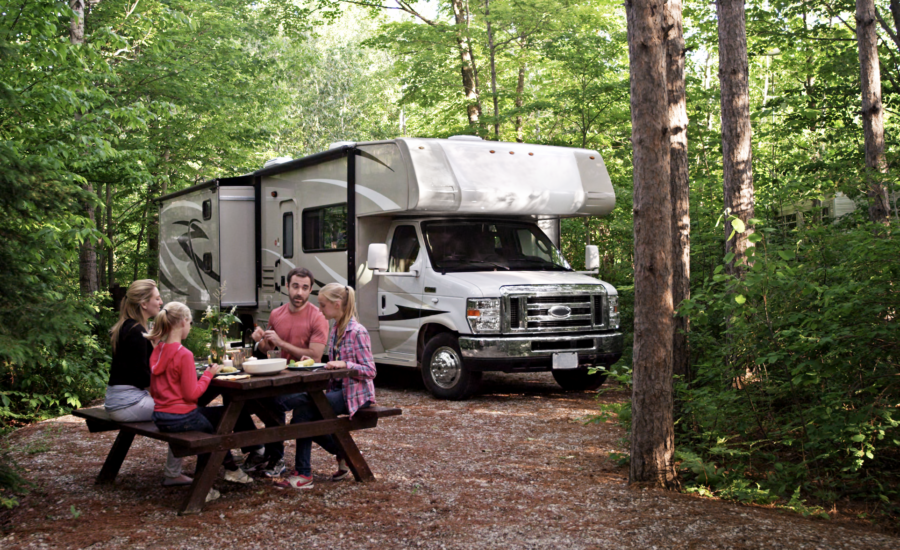Why so many Canadians are RVing right now
With most vacation options wiped out by COVID-19 precautions, the idea of owning or renting a recreational vehicle your family can travel, eat and sleep in, has fresh appeal. Here's what you need to know before you buy or rent an RV.












Some other points in favour of tent trailers:
– they will fit in your garage if storage is an issue
– if you buy a bare bones one (we always preferred cooking with the Coleman outside) there is less to go wrong and you can purchase used for very cheap.
-easy to tow
-can pick up a camping chem toilet from Canadian Tire to avoid using outhouses
Reality check here, nowhere in this article was there any mention of vermin! Now, maybe the east coast doesn’t have any rodents (mice, rats, squirrels) but I find that hard to believe. These vehicles are manufactured with lots of small spaces where rodents can get into the floor structure and by extension the trailer itself. Just remember that when you park it for the winter it becomes a cosy convenient place for them to take up residence. It is very important when buying used from anyone including a dealer that you check the trailer out thoroughly. Take along someone who knows what to look for and open all the cupboards, remove access panels for the fridge, furnace and hot water heater as well as where the plumbing comes through the floor. My experience has been that unless you ask you won’t be told and even then you may not get a straight answer.
Honest to god, Moneysense. Maybe next time you should actually have someone with even five minutes of RV experience write the article about RVing! It would have so much more authority.
Would you have allowed someone who doesn’t own a single mutual fund write a piece about investing in funds?
And BTW, author, a 33-ft motorhome is a very large one to take out for your first run. Not that you’d know that …. because of course you have ZERO RV experience.
So disappointed.
Thanks for your comment, and we do appreciate hearing all points of view from our valued readers. For this article, we chose an experienced travel writer to explore the RV trend. Ms Augustine Brown has been published in National Geographic Traveler, The Globe and Mail, Canadian Geographic, The Guardian, and many others. This post was not intended to be a reference for those already experienced with RV travel, but rather a relatable introduction for those considering their first trips.
A banner year in the industry this year. So many folks are now chasing so few remaining overpriced rv’s and then trying to shoehorn themselves into non-existant camp spaces…especially here in BC.
I think people should give this year a rest and let their ramped up desire a chance to settle down. That way they won’t be so disappointed with their expensive purchase that will see so little use.
Been there, done that and glad we are now out of the Competition.
I’m pretty sure this would have been a much more effective article if was written by someone who had already rented the RV. Basically this author did some online research, made some phonecalls, then wrote an article. Any reader could have done that. Much more valuable are the tips you have AFTER the vacation, for the things no one told you. Having said that, you left out the issue of gas. When we rented an RV and did a long trip I could not believe how much money we spent on gas for that thing. In the end, it would have been cheaper for us to fly to Nova Scotia rather drive the RV. However the experience was fun. Also, I agree with the other comment here that 33 feet is pretty challenging for a beginner. I’d really love to hear how your trip went after you’re back.
And good luck getting quality sites now with so many newbies trying (rv) camping. For those looking for used rv’s….wait a year or two and there will be plenty for sale after the novelty has worn off.
A crucial element is missing from the piece: safety. How and where will the driver(s) acquire the skills needed to control an RV safely, particularly a bigger one? And if the chosen RV is a trailer, how can the driver be certain that the tow vehicle’s power, torque, braking, brake controller, and stability match the demands that the loaded trailer will place upon it? This includes doing the math and totalling up the weight of the trailer (including boats, bikes, etc.) and the people, pets, and gear in the tow vehicle, and ensuring that they do not exceed the capabilities of the tow vehicle. Do not take the word of the company renting or selling you the unit. Some of them will say anything to close a deal. There are RVing forums online with highly experienced members who will provide reliable advice to newcomers. After all, they and their loved ones will be sharing the road with those first-timers, and they want everyone to enjoy camping and return home safely.
So many Canadians are rving right now because of the extremely high cost of housing in Canada. I live full time in an rv for this reason. I live in an rv park where 90% of the residents live here full time. It won’t be long before there will be no more room for weekend campers.